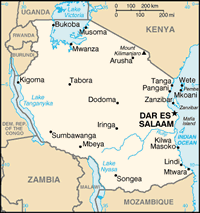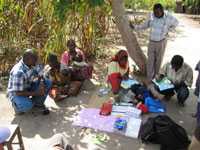CDC Activities in Tanzania
US President's Malaria Initiative
CDC supports malaria control efforts for both mainland Tanzania’s National Malaria Control Programme and Zanzibar’s Malaria Control Programme as part of the U.S. President’s Malaria Initiative (PMI). Since 2005, this effort has produced phenomenal gains in access to malaria prevention and treatment interventions in Tanzania and across the Zanzibar Archipelago. Read more about mainland Tanzania’s success in saving children’s lives in the RBM Progress & Impact Series. For more information on PMI activities in Tanzania, see www.pmi.gov.

Tanzania
CDC/IHI Malaria Program in Tanzania
In addition to the agency’s key role in guiding and implementing PMI in the United Republic, CDC and the Ifakara Health Institute (IHI) have collaborated on a series of cooperative agreements since 2000. The CDC/IHI Malaria Programme in Tanzania has emerged as a globally recognized leader in implementation and applied research to guide malaria control programs for both the mainland and Zanzibar Ministries of Health and Social Welfare and public health programs across the continent.
Between 2000 and 2012 the CDC/IHI Malaria Programme in Tanzania achieved the following milestones:
- Completed the first programmatic implementation of artemisinin-containing combination therapy (ACT) in tropical Africa, delivering over a million treatment doses of highly effective malaria treatment in an isolated rural district for more than 4 years.
- Established the complementary role of free and market-based strategies for delivering insecticide-treated mosquito nets (ITNs) for malaria prevention.
- Characterized the public- and private-sector markets for malaria treatment and demonstrated how national policies can affect the equitable access to treatment for impoverished rural communities.
- Documented the distribution of drug-resistant strains of malaria across rural Tanzania and the rest of Africa.
- Established the relative contribution of diagnostically confirmed malaria among patients presenting to first-line health facilities and drug stores in rural Tanzania.
- Completed three national surveys on the quality of antimalarial drugs in the retail sector and established the extent of distribution of artemisinin monotherapies nationwide in 2005, 2010 and 2012.
- Contributed to a global model of malaria risk, coordinated by Oxford University.
- Established best practices for achieving high adherence to complex 3-day treatment regimens with at least 2 ACTs.
- Compared 3 possible regimens for the intermittent preventive treatment of malaria in pregnancy.
- Established the impact of ACT and ITNs on nearly eliminating malaria transmission in the Zanzibar Archipelago.
- Provided detailed implementation evidence for the roll-out of rapid diagnostic tests for malaria in rural Africa.
- Demonstrated how interventions to improve the care of severely ill children could be effectively implemented in the context of the Integrated Management of Childhood Illness.
- Monitored the costs and policy implications of delivering ACT as routine first-line treatment for malaria at district and national levels.
- Elaborated the health-equity implications of delivering malaria treatment and prevention.
- Completed an evaluation of the nonmalarial causes of childhood febrile illness.
- Established the public health impact of withholding malaria treatment for febrile children who test negative for malaria infection.
- Documented the prevalence of malaria infection among clients purchasing medicines from retail drug stores.
- Completed detailed qualitative studies on community perceptions of malaria diagnostic and treatment services in three regions.

IMPACT Tz team members conducting a household survey in Rufiji District, 2006.
(Courtesy S. Patrick Kachur, CDC)
These activities were completed as part of the Interdisciplinary Monitoring Project for Antimalarial Combination Therapy in Tanzania (IMPACT-Tz), supported by CDC, the US Agency for International Development, and the Wellcome Trust. In addition to IHI, key partners included the Australian National University, the London School of Hygiene and Tropical Medicine, and the Swiss Tropical and Public Health Institute.
Since the completion of IMPACT-Tz, the CDC/IHI Malaria Programme in Tanzania has continued to support the Malaria Control Programmes in both Ministries by providing:
- Funding for in vivo and in vitro assays of antimalarial drug resistance.
- Opportunities for Tanzanian scientists to train alongside US-based laboratorians.
- Support for quality assurance of rapid diagnostic tests for malaria.
- Technical guidance for the operational research component of mainland Tanzania’s Round 4 award from the Global Fund to Fight HIV/AIDS, Tuberculosis and Malaria (GFATM).
Beginning in 2010 the CDC/IHI Malaria Programme implemented an evaluation of mainland Tanzania’s Round 7 award from GFATM to explore the impact of introducing rapid diagnostic tests for malaria and a highly subsidized ACT in the private retail sector. This was done collaboratively with the ACT Consortium at the London School of Hygiene and Tropical Medicine, through a grant from the Bill and Melinda Gates Foundation. CDC and IHI are looking forward to future collaborative opportunities along this model.
For more information about the CDC/ IHI Malaria Programme in Tanzania, contact:
Dr. Saumu Ahmed, MD, PhD
Ifakara Health Research & Development Centre
PO Box 78373
Dar es Salaam, Tanzania
Tel: 255 222 774 714
Fax: 255 222 771 7143
E-mail: sahmed@ihi.or.tz
Lynn Paxton, MD, MPH
CDC PMI Resident Advisor
CDC-Tanzania
E-mail: LPaxton@cdc.gov
Julie Gutman, MD, CDC
Medical Officer
Malaria Branch, Division of Parasitic Diseases and Malaria
Center for Global Health
Centers for Disease Control and Prevention
1600 Clifton Road, MS A-06
Atlanta, Georgia 30333 USA
Tel: 1 404 718 4730
E-mail: JGutman@cdc.gov
- Page last reviewed: September 21, 2015
- Page last updated: September 21, 2015
- Content source:


 ShareCompartir
ShareCompartir